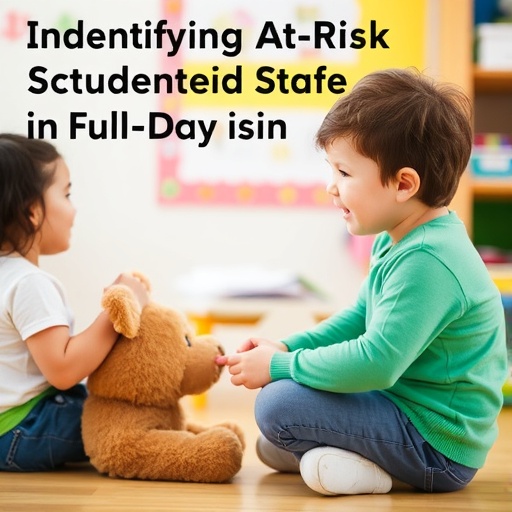In the evolving landscape of early childhood education, the full-day kindergarten (FDK) program has garnered significant attention for its potential to enhance foundational learning. However, a pressing question remains: which children are most at risk within these programs, and how can educators and policymakers intervene effectively to support them? Recent research conducted by S. Gooderham offers a comprehensive analysis aimed at addressing this critical issue, shedding light on the multifaceted nature of risk factors in FDK settings.
The full-day kindergarten model, widely adopted across diverse educational systems, extends the traditional half-day format to encompass a full school day. This extension is designed to provide enriched learning experiences, socialization opportunities, and developmental support. Despite these intended benefits, the heterogeneity among children’s developmental trajectories means that not all students benefit equally. Gooderham’s work delves into identifying the profiles of those who are at heightened risk of underperforming or experiencing adverse outcomes within this structure.
Central to Gooderham’s investigation is the utilization of longitudinal data that tracks children’s academic performance, socio-emotional development, and family background variables over time. The methodology employs advanced statistical techniques, including multilevel modeling and latent class analysis, to parse out the nuanced interaction effects of individual, familial, and environmental factors. These techniques enable a granular understanding of risk that transcends simplistic labels, unveiling complex patterns that may otherwise go unnoticed.
One critical insight from this research is the identification of early developmental delays, particularly in language and communication skills, as potent predictors of risk in FDK programs. Children entering kindergarten with such delays are more likely to struggle academically and socially, despite the extended exposure provided by full-day attendance. This finding underscores the importance of early screening and targeted interventions before children enter formal schooling.
Furthermore, socioeconomic status emerges as a significant contextual factor moderating children’s experiences and outcomes in FDK. Low-income families often face barriers such as limited access to preschool education, healthcare, and parental support, all of which compound the challenges faced by at-risk children. Gooderham’s analysis reveals that children from these backgrounds are disproportionately represented among those flagged as at-risk, highlighting the interplay between societal inequities and educational success.
Crucially, the study also evaluates program-level variables, including teacher qualifications, classroom climate, and pedagogical approaches. High-quality instructional practices and supportive classrooms can mitigate some of the risks associated with individual and family-level challenges. This finding suggests that while risk factors may be intrinsic or extrinsic to the child, the educational environment plays a pivotal role in shaping trajectories.
The research further explores the role of social-emotional competencies, such as self-regulation and peer interaction skills, in buffering risk. Children who demonstrate higher levels of these competencies tend to exhibit resilience, navigating the demands of a full-day program more successfully. Consequently, embedding social-emotional learning (SEL) within the FDK curriculum could be a promising avenue for promoting equity and inclusion.
Gooderham’s findings carry significant implications for policy and practice. First, a one-size-fits-all approach within full-day kindergarten programs is insufficient to meet the diverse needs of students. Differentiated instruction, informed by rigorous assessments and ongoing monitoring, is essential. Second, cross-sector collaboration between educators, healthcare providers, and social services is critical to address the multifactorial nature of risk comprehensively.
Moreover, the research advocates for the integration of family engagement initiatives within FDK. Parental involvement emerges as a protective factor, buffering the adverse effects of socioeconomic disadvantage and developmental delays. Programs that empower parents with resources and strategies to support learning at home can fortify the gains achieved in the classroom.
From a technological standpoint, Gooderham highlights the potential of early warning systems powered by machine learning algorithms. These systems can synthesize vast amounts of data to flag at-risk students promptly, enabling timely and targeted interventions. Nonetheless, ethical considerations around data privacy and equitable access must guide the deployment of such technologies.
Internationally, the study situates the FDK risk debate within broader educational equity dialogues. Comparisons with educational systems that do not adopt full-day kindergarten or that implement alternative early childhood strategies reveal varying risk profiles and outcomes, suggesting context-specific approaches are necessary.
The longitudinal aspect of the study also provides a window into long-term implications for academic achievement and socio-emotional well-being. Children identified as at-risk in FDK who do not receive adequate supports are more likely to experience challenges in later schooling stages, reinforcing the critical nature of early identification and intervention.
In conclusion, Gooderham’s research offers an essential roadmap for educators, policymakers, and researchers striving to optimize full-day kindergarten programs. By disentangling the complex web of risk factors, it calls for nuanced, evidence-based strategies that recognize the heterogeneity of learners. The path forward lies in targeted supports, enriched curricula, and systemic collaboration aimed at ensuring all children can thrive in the earliest phase of their educational journey.
Subject of Research:
Determining risk factors impacting children’s outcomes in full-day kindergarten programs.
Article Title:
Determining who is at-risk in the full-day kindergarten program.
Article References:
Gooderham, S. Determining who is at-risk in the full-day kindergarten program. ICEP 17, 8 (2023). https://doi.org/10.1186/s40723-023-00111-w
Image Credits: AI Generated
DOI:
https://doi.org/10.1186/s40723-023-00111-w




